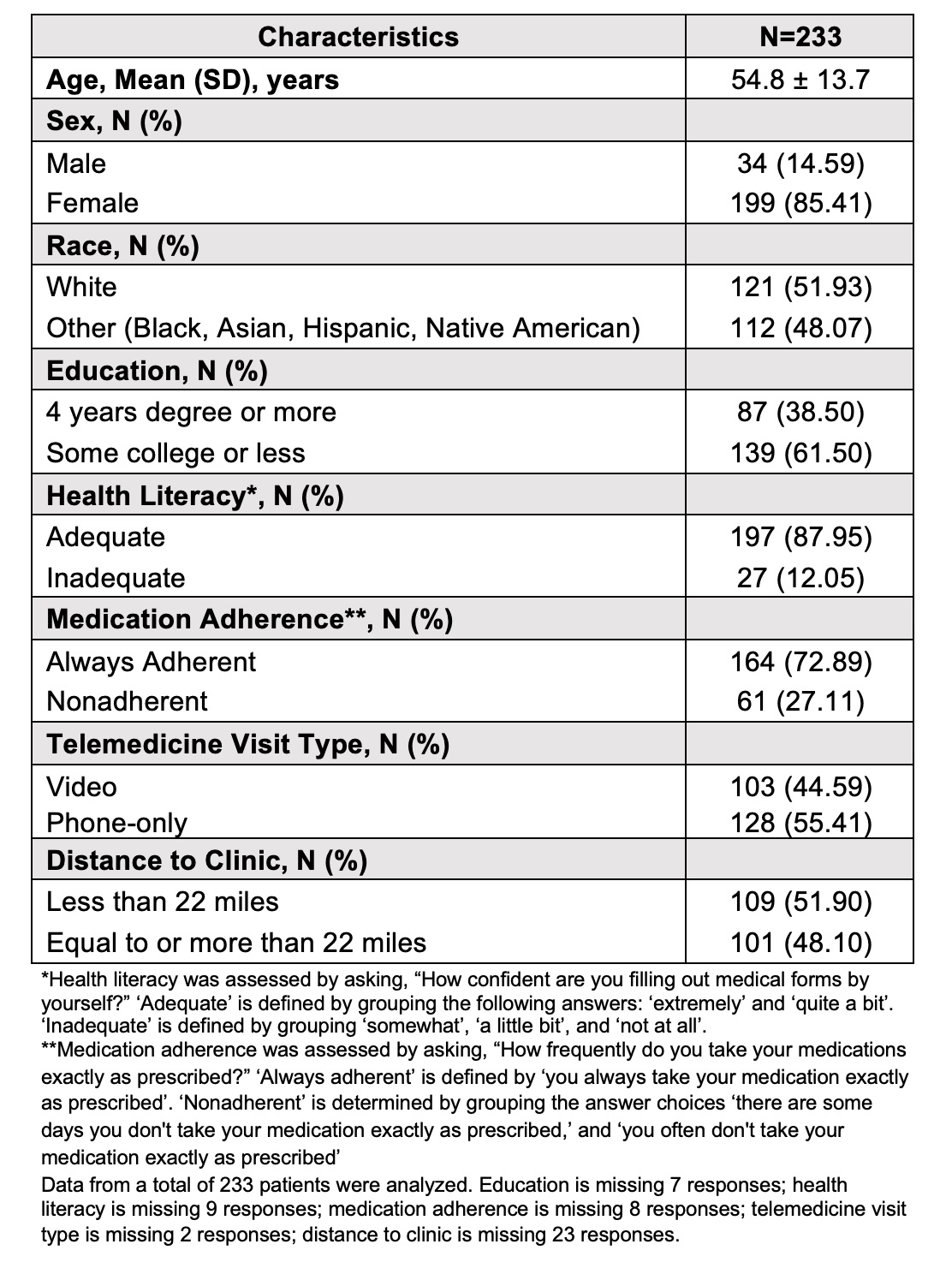Session Information
Date: Sunday, October 26, 2025
Title: (0357–0386) Patient Outcomes, Preferences, & Attitudes Poster I
Session Type: Poster Session A
Session Time: 10:30AM-12:30PM
Background/Purpose: Home-based telemedicine is an efficient healthcare delivery approach. A recent randomized clinical trial (RCT) found that in-person visits may be preferred among rheumatology patients. Thus, it is key to understand factors influencing patient acceptability of telemedicine. We aimed to identify socioeconomic and demographic factors associated with patient acceptability of rheumatology care via telemedicine.
Methods: We utilized data from an RCT (August 2021-January 2023) comparing telemedicine to in-person rheumatology care at two U.S. academic medical centers. The primary outcome was patient acceptability of telemedicine using a 17-item validated Telemedicine Perception Questionnaire (TMPQ). TMPQ measures usefulness, reliability, ease of use, interaction quality, and satisfaction with telemedicine. Responses were scored 1-5 and summed for each respondent; higher scores represented higher acceptability. We excluded data from patients answering < 50% of the questions. For other missing data, we used the patient’s mean score for answered questions, scaled to the full scale of items (sum of items answered multiplied by 17 divided by the number of questions answered). Our independent variables were age, sex, race, telemedicine visit type (audio-only vs video), geocoded distance from patient’s home to clinic, education level (≥4 years degree vs ≤some college), health literacy (adequate vs inadequate) and medication adherence (always vs non-adherent) (Table 1 footnote for details). We used frequencies (proportions) to describe categorical variables and means (SD) for continuous variables. We created univariable and multivariable linear regression models to analyze the association between independent variables and telemedicine acceptability via TMPQ (continuous). Statistical significance was defined as p < 0.05.
Results: We analyzed data from 233 patients who had telemedicine visits with TMPQ scores available. Our study population included 85.4% female and 51.9% White patients. The mean (SD) age was 54.8 (13.7) years. The mean (SD) TMPQ score was 65.9 (10.7) (Table 1). In univariable analysis, White (vs other) race (p=0.03), adequate (vs inadequate) health literacy (p=0.01), and high medication adherence (vs non-adherence) (p=0.03) were significantly associated with higher TMPQ scores (Table 2). Multivariable linear regression (Table 2) confirmed that high medication adherence (β=4.11, 95% CI 1.01-7.21, p=0.01) and White race (β=3.00, 95% CI 0.12-5.89, p=0.04) were associated with higher TMPQ scores. Adequate health literacy was not statistically significant but had a consistent trend toward higher TMPQ scores.
Conclusion: We observed variation in telemedicine acceptability by patient characteristics and identified high medication adherence, White race, and adequate health literacy as positive predictors. Our findings provide insight into factors associated with telemedicine acceptability in rheumatology patients and can help clinicians predict who might be receptive to telemedicine and inform future research to better understand how lower telemedicine acceptability can be mitigated in certain populations, thus enhancing a patient-centered approach to care delivery.
 Table 1. Demographic and socioeconomic characteristics of study participants.
Table 1. Demographic and socioeconomic characteristics of study participants.
.jpg) Table 2. Univariable and multivariable linear regression analysis of factors associated with the acceptability of telemedicine using the TMPQ score. Bolded p < 0.05 represents statistical significance.
Table 2. Univariable and multivariable linear regression analysis of factors associated with the acceptability of telemedicine using the TMPQ score. Bolded p < 0.05 represents statistical significance.
To cite this abstract in AMA style:
Farooq H, Jackson L, Begum R, Cutter G, Saag K, Yazdany J, Danila M. Factors Associated with Patient Acceptability of Rheumatology Care Delivered by Telemedicine [abstract]. Arthritis Rheumatol. 2025; 77 (suppl 9). https://acrabstracts.org/abstract/factors-associated-with-patient-acceptability-of-rheumatology-care-delivered-by-telemedicine/. Accessed .« Back to ACR Convergence 2025
ACR Meeting Abstracts - https://acrabstracts.org/abstract/factors-associated-with-patient-acceptability-of-rheumatology-care-delivered-by-telemedicine/
